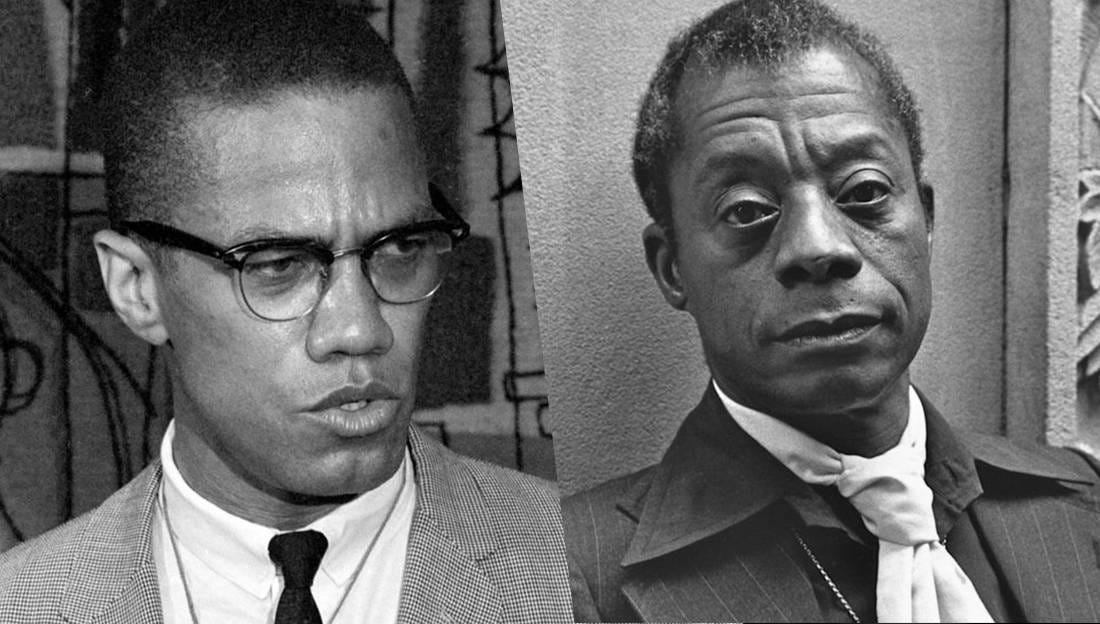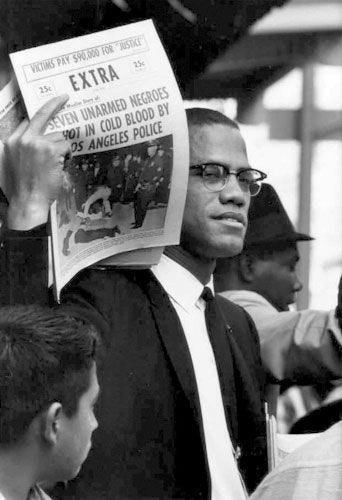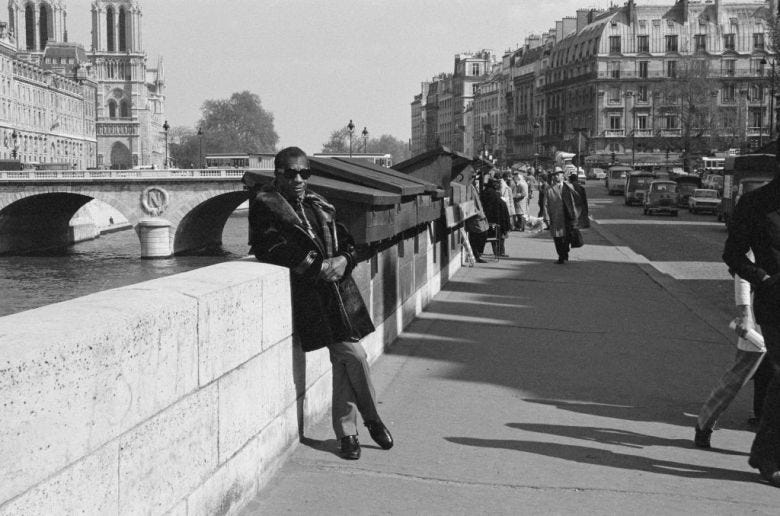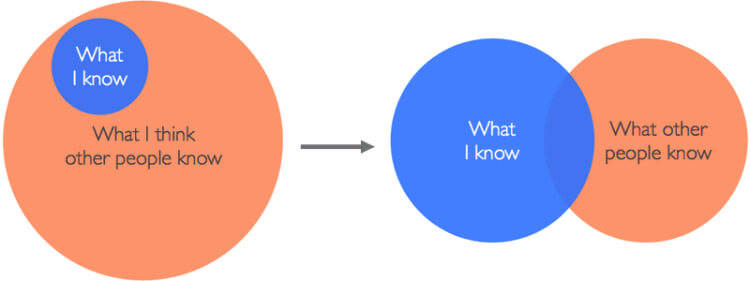
CULTURE THING:
In 1963, James Baldwin had a lot going on. Earlier in the year, he released The Fire Next Time. For most of the year, he witnessed and participated in civil rights protests across the country, including the March on Washington. With so much going on, he had much to discuss with Malcolm X during a debate between the two, broadcasted on radio from Chicago on September 5th, 1963.
The two men were at odds. Baldwin advocated strong and purposeful action but never wavered his approach from using peaceful methods to achieve results. Malcolm X, by contrast, saw no path forward for Black America without aggressively claiming rights for not only Blacks, but all oppressed peoples. To Malcolm, any concessions made in the face of passive movements or “respectable protests” would be framed as gifts from the oppressors. Equality could not be given; it had to be taken.
Almost 60 years later, the discussion is both inspiring and depressing. While a great discussion between two of the smartest men to ever stand on American soil, the reality is that many of the issues that both men discuss still plague this country generations later. The full debate can be heard via the audio player at the top of this newsletter. I’ve picked some excerpts to share in today’s newsletter, but the full transcript of the debate can be found here.

(Malcolm X Holding up Black Muslim Newspaper, Chicago, Illinois, 1963. Photo by Gordon Parks. Yes, THAT Gordon Parks.)
MALCOLM X:
I think that this is, in my opinion, why we disagree with the sit-in movement. If they are willing to wait for another hundred years for the white man to change his mind to accept them as a human being, then they’re wrong. But if they’re willing to lay down their life tonight, or in the morning, in order that we can have what is ours by right tonight, or in the morning, then it’s a good move. But as long as they’re willing to wait for the white man to make up his mind that they are qualified to be respected as human beings, then I’m afraid that all of their waiting and their planning is for naught.
When the black man here in America begins to stand up and speak about the crimes that are committed against him throughout America every day, no let up, just different forms, immediately a black man who dwells on that is considered a racist, considered an extremist or considered someone who is advocating a doctrine that will bring about violence and bring about a deterioration in the so-called good relations that are supposed to be developing between black and white in this country. So, we just can’t go along with any of that.
I would like to say one more thing, too, on that nonviolent thing, that the black man in America is the only one who is encouraged to be nonviolent, or the black man in Africa or the black man in Asia. Never do you find white people encouraging other whites to be nonviolent. Whites idolize fighters. They idolize the Hungarian freedom fighters who came to this country and right now can work on jobs that the sit-in students can’t get, can live in neighborhoods that the sit-in students can’t live in, and can go into public places that the student sit-ins can’t go, because they are fighters. Everyone loves a fighter. They respect a fighter. But at the same time that they admire these fighters, they encourage the so-called Negro in America to get his desires fulfilled with a sit-in stroke or a passive approach or a love-your-enemy approach or pray for those who despitefully use you. This is insane.
And the history, as Mr. Baldwin pointed out, of the white man here in America and the black man here in America points up the fact that the Negro, or the man here who calls himself a Negro, is just an ex-slave. If he is an ex-slave — I’d rather say he’s still a slave, but he’s wearing his slavemaster’s name, the name that was given to him during slavery. He’s speaking the language of the man who made him a slave, because he has no knowledge of his own tongue. He only knows the history, his own history, as taught to him by his former slavemaster, who purposely hid from him his own history to make him think that he was an inferior being before being brought here.

(Baldwin in Paris. Photo by Sophie Bassouls / Getty Images)
JAMES BALDWIN:
I would be a very different person if I were not the descendant of a slave. In fact, I am the descendant of a slave, and this is one of the things that I have to deal with, because it is true. And I don’t think that it has to be a badge of shame. Negroes are not the only slaves. We are not the only descendants of slaves. I can’t eliminate one-half of my ancestors. My grandmother was raped, let us say. This is a fact I have to face. This means that I am no longer a pure African and that my relationship to white people is not that of a Congolese to Belgium, and cannot be, no matter how hard I try to make it that. My relationship to white people is dictated by my mother’s relationship to them, my father’s, by the fact that my grandmother nursed children who grew up to lynch her children, that my father’s fathers were always under the heel of some benevolent white man. And a whole myth of this experience has come into being in the country, which is at its highest seen in Faulkner and at its lowest seen in Margaret Mitchell. Now, I don’t think that we can be liberated from this history until we are willing to deal with it. And this means that I have to deal with it, as well as any white man in the country has to deal with it. There is really too much and too little to say.
This country has lied about the Negro situation for 100 years. And now what has happened is that the lies are no longer viable, can no longer be accepted, even when they can be told. And the country has waited so long, and it does not know how to handle this, and it’s created a moral vacuum. There’s a moral vacuum in the Negro ghettos in the same way there’s a moral vacuum in the audience, which is filled with desperate people. And I don’t think that we can afford this.
You cannot live, it seems to me, in — you cannot live 30 years, let’s say, with something in your closet, which you know is there, and pretend it is not there, without something terrible happening to you. By and by, what I cannot say — if I know that any one of you, you know, has murdered your brother, your mother, and the corpse is in this room and under the table, and I know it and you know it, and you know I know it, and we cannot talk about it, it takes no time at all before we cannot talk about anything, before absolute silence descends. And that kind of silence has descended on this country. I think that this country has become almost inconceivably radical overnight. It has really got to do something it has not done before, and this involves the humanity of everybody in it. And the key to this is in the Negro. If one can face that, one can face anything. But that has not been faced. And I think this is the reason for the confusion and the ferment and the great, great danger.
There’s something else, at the moment, that bothers me, that I think there’s a great deal — there’s a lot of — there’s not much clarity in this question of violence, from my point of view, from where I sit, whether or not — no matter what Mr. X wants, no matter what I want. I believe, for example, that one of these days, maybe tomorrow, Birmingham, Alabama, will probably blow up. (NOTE: Baldwin said this exactly one week before the 16th Street Baptist Church bombing in Birmingham) And if Birmingham blows up, it will not just stretch to Atlanta. It will stretch to Boston. There’s a kind of fuse. There’s a kind of — there’s an undercurrent. There’s something which unites all Negroes in this country, so that what happens in Birmingham can blow up Harlem. It has happened before. And unless we are extremely swift and miraculously swift, it will happen again.
This weekend, my wife ordered the PPV from New Zealand’s Royal Family Dance Crew. Without a doubt, it’s the best production made during the pandemic that I’ve seen thus far. These folks deserve NBA supermax contracts. As an added bonus, it’s a great feeling knowing that they’re all performing completely healthy because New Zealand actually took the pandemic seriously. Order it and watch it this week if you work in culture, even if you don’t “like” dance.
The Royal Family - Virtual Experience: Iconic Edition
MARKETING THING:

(Collin Ingram)
For September, the Marketing section will be dedicated to helping you beat imposter syndrome and get better at self-promotion.
Over the last month or two, a LOT of readers have shared worries about self-promotion and marketing their work. One of the most consistent themes among those who reached out is a very obvious theme of imposter syndrome, especially with women and non-white professionals. Given the reality of how hard it is to be successful with a full sense of self-confidence, worrying about where you stand in the broader landscape adds extra stress that nobody needs.
To start, see where you stand when it comes to having imposter syndrome by taking the Clance Impostor Phenomenon Test, created by Dr. Pauline Rose Clance, Ph. D.* In 1978, Dr. Clance introduced the term “imposter phenomenon” to the world via an article called "The Impostor Phenomenon in High Achieving Women: Dynamics and Therapeutic Intervention" which is worth a Google if you’re curious about how modern social phenomenons are first introduced to larger society.
Take this test when you have a few mins to kill and see where you stand. I got an 82 (!!!) the first time I took this, so if you score over 40, do not feel ashamed!
*This test should not be thought of as an official diagnosis, but more of a way to do self-analysis. For the love of God, seek professional opinions if you feel like you suffer from extreme imposter syndrome, anxiety, depression or any other mental health concerns.
HOW TO HELP BLACK LIVES IN 30 MINS OR LESS:
When it comes to taking the steps needed to create a racially equal America, I’ve heard from many well-intentioned non-Black people over the last two months that one of the most daunting things for them is trying to figure out what they can personally do make things better.
Some folks see these massive issues as a significant problem that cannot be defeated, so they struggle to figure out what one person can do, which leads to them not doing much other than posting to IG. Some of that is not wanting to seem like you’re doing too much, some of that is fear your intentions will be misunderstood.
What if I told you that for only 30 minutes a week, you can help black lives no matter where you are or how much money you make? Here’s how:
Carve out 30 minutes in your calendar this week. Call it “Being A Better Person Time” or “Set a Good Example for my Kid” Time, whatever works.
Click a link and make a call or donate or sign a petition. Just do one thing in that 30 min window.
This weekend, share the above link with your three closest friends and say, “Hey, I’m (calling/donating/signing a petition). I’m worried about how things will be for future generations, so I’m doing something about it. If you’re interested, here’s the link!” If you have a group chat, drop it into your group chat!
Repeat the following week for as long as you can. Do it while you online shop, do it while you’re on an annoying call, hell, you can do it while you poop, I genuinely don’t care! Whatever it takes! It is the absolute least that you can do, but you’ll get a sense of accomplishment and the knowledge that you at least did SOMETHING to help. You have a vision of who you want to be, right? That ideal version of yourself that does the right thing when given a chance and leads by example? This is that chance. You can do it!
BONUS: You won’t have to lie to your kids or grandkids about being on the right side of history! You can be all like, “Children/Grandchildren, we don’t tolerate that racist shit in this house. If anyone says otherwise, send them to me.” and you’ll sound all tough and cool, and your kids or grandkids will respect and love you and not want to be racists…guess what? That means less racist people in the future!!!
Look at that. It turns out you had a bigger impact than you thought the whole time!
ANNOUNCEMENTS:
Starting with this newsletter, Office Hours will now move to Mondays and Fridays. Format will be full culture/music/marketing on Mondays and all-music on Fridays. It makes more sense to drop two great newsletters than three fake decent ones. For the amazing folks who have already become paid subscribers, I owe it to you all to make better stuff now that I’ve gotten the hang of getting this thing out the door. Speaking of getting things out the door…
The Office Hours with Ernest Wilkins podcast returns in the next two weeks. The podcast will be a paid-subscriber only perk, with free episodes when2 appropriate. My mission is to reward and build stronger relationships with my subscribers as a thank you for your consistent support. Speaking of support, here are two easy ways that you can support this newsletter!!!!!
Become a paid supporter of the newsletter on an ongoing basis. For the price of a shared appetizer and two rounds of drinks, you can support a Black-owned media business.
HEADS UP: You have until NEXT MONDAY (Monday, September 7th) to take advantage of my 50% off paid subscription promotion via this button below.
Can’t commit to an ongoing subscription right now? I get it, it’s crazy out here. However, if you enjoy what you read, please show your support for my work with a one-time donation!
Office Hours is written and curated by Ernest Wilkins.
Follow me on Twitter/Clubhouse/IG @ErnestWilkins.
Want to work with me? Send me an e-mail.












Share this post